How to Make Rose Water at Home 2 Ways – Easy DIY Rosewater Recipe
How to make rose water at home! An easy DIY rose water recipe that can be used for culinary purposes, skincare and more! We offer two methods for making homemade rosewater in this post.
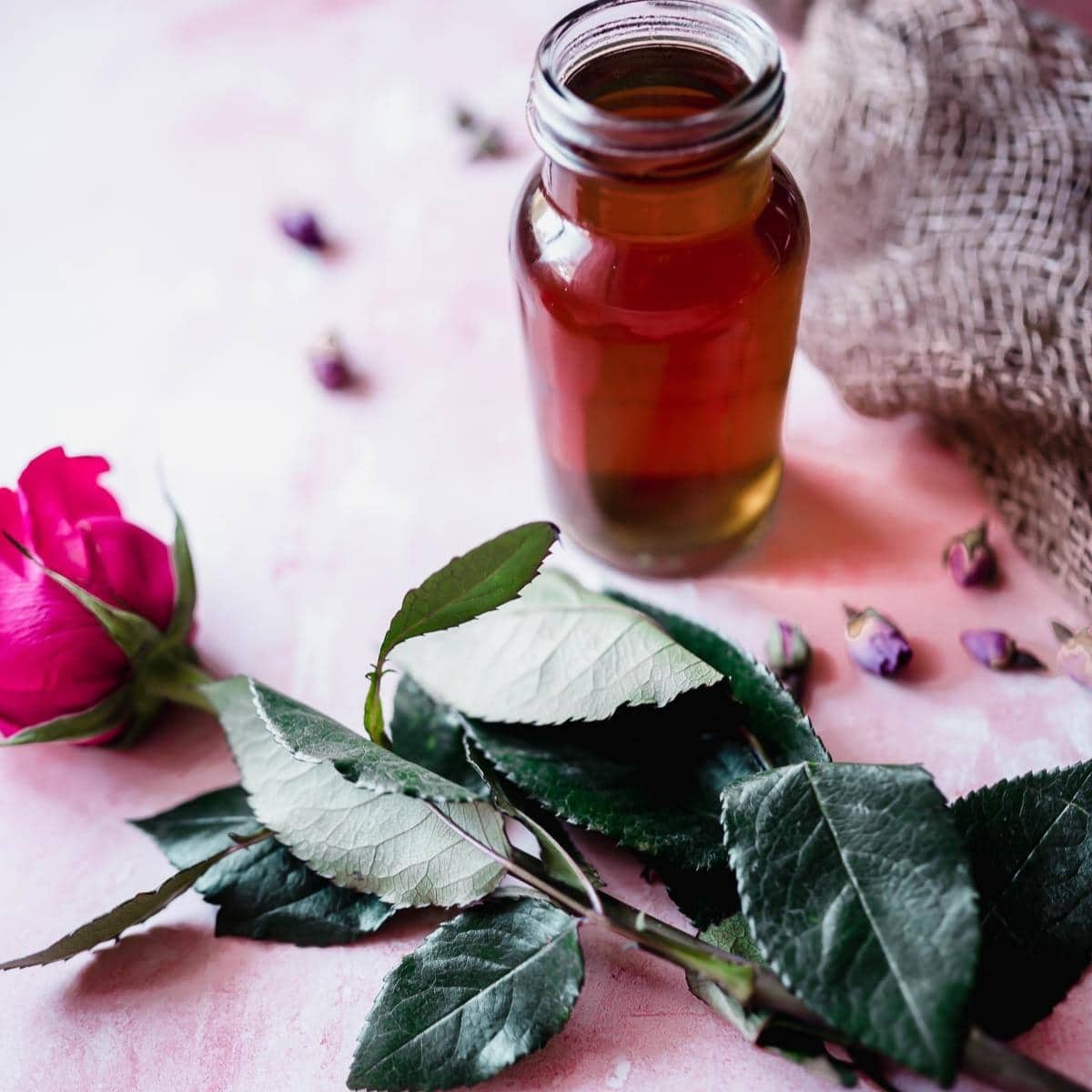
Love the fragrance and flavor of roses but don’t want to spend a fortune on rose water? You can make your own rose water at home with just a few simple ingredients. In this blog post, we will show you two ways to make rose water – one using the distillation method and one using the simmering method.
🌹 What is Rose Water?
Rose water is the natural byproduct of steeping rose petals in water or distilling rose petals in steam. Rose water has anti-inflammatory and antiseptic properties, which is relevant whether you use rosewater for culinary uses or skincare applications.
📜 What is the History of Rose Water?
The rose has long been associated with love, beauty, and happiness. It’s no wonder that rose water is such a popular ingredient in perfumes. Rose water can be traced back to ancient times when it was used for religious ceremonies and medicinal purposes by the Egyptians. In medieval times, rose water was used for everything from bathing to infusing marzipan treats. Nearly every culture has a particular culinary use for rosewater!
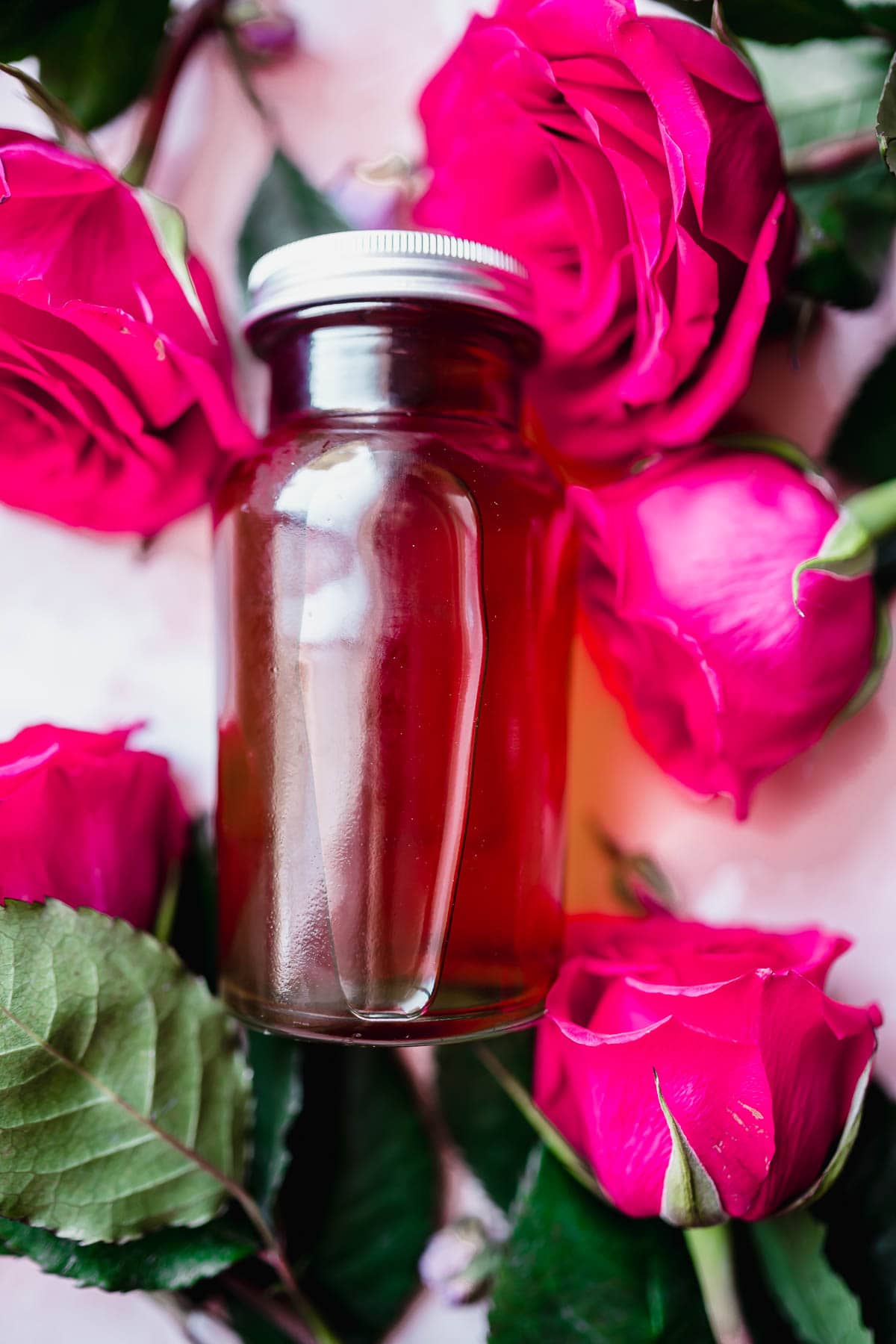
❤️ Why You’ll Love This Recipe
- It’s easy to make.
- It’s affordable.
- Rose water has many health benefits.
- It smells amazing!
✔️ What Are Some Benefits of Using Rose Water?
- Soothes sunburns and skin irritations, including acne, eczema, dandruff and rosacea.
- Has natural anti-inflammatory properties.
- Has antiseptic properties.
- Is great for adding a rose scent to homemade beauty products.
- Adds a beautiful fragrance and flavor to culinary creations.
🗒️ Ingredient Notes
Rose petals: You can use fresh or dried rose petals to make rose water. If you’re using fresh rose petals, be sure to wash them well before using them. If using for culinary/internal use, especially opt for organic, culinary-grade rose petals.
Distilled water: Distilled water is preferable for making rose water because it has a higher pH level and is free of contaminants. You can find distilled water at most grocery stores or drugstores.
♨️ How to Make Rose Water – Two Ways!
Method One: Simmering Rose Water
Equipment Needed for Simmering Method Homemade Rose Water
- 1 cup measuring cup
- saucepan
- strainer
- 1 cup dried rose petals or 2 cups fresh petals
- 5 cups of water
Instructions: Simmering Method Rose Water
Step 1. Add 1 cup dried rose petals or 2 cups fresh petals (if using fresh, rinse to remove bugs and dirt – only use organic to avoid pesticides) to a saucepan with 5 cups of water.
Step 2. Bring to a boil
Step 3. Once it has come to a boil, reduce to simmer, and simmer for 20 minutes.
Step 4. Turn off heat and let sit for 1 hour before straining the liquid and bottling. Cheesecloth, a nut milk bag or a metal fine mesh sieve work well for straining.
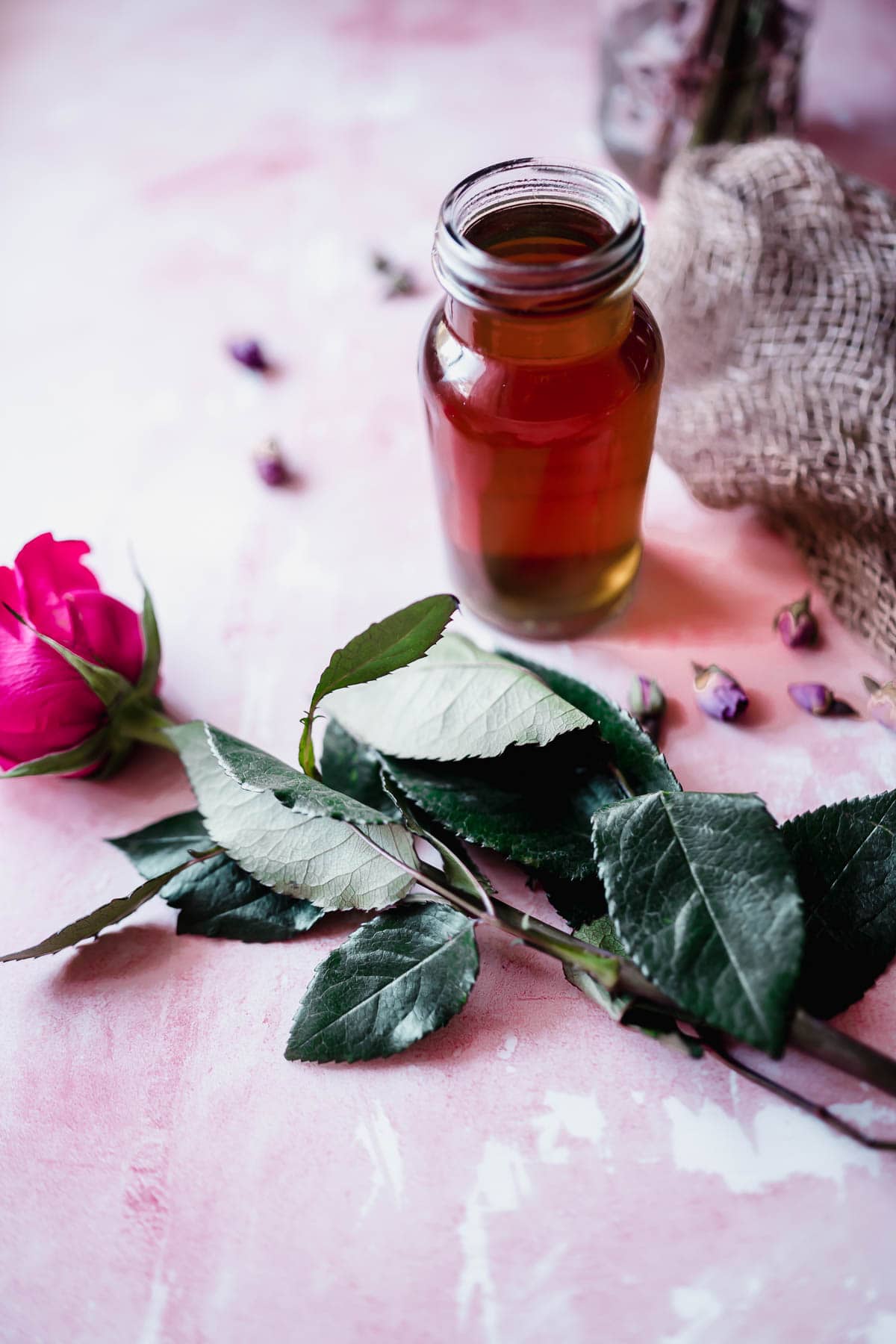
Method 2: Distilling Rose Water
Equipment Needed for Distilling Method Homemade Rose Water
- heat-proof bowl
- large pot with lid
- 5 cups of water
- 1 cup dried rose petals or 2 cups fresh petals
- ice
Instructions: Distilling Method Rose Water
Step 1. Place a heat-proof bowl in the center of a large pot.
Step 2. Add rose petals and water to the pot around the bowl (make sure to not get anything inside of the bowl).
Step 3. Place the pot’s lids on upside down, then bring the water to a boil.
Step 4. Once boiling, reduce to a simmer, and add some ice to the top of the lid.
Step 5. As the ice melts, pour off the water and add more ice.
Step 6. Continue this process until the color from the petals fades and some clean clear rose water has collected inside the bowl.
Step 7. Allow everything to cool before bottling and using.
🎂 How to Use Rose Water
Rose water is great for adding a rose scent to your homemade beauty products. It’s also great added to body and face mists, rosewater milk, rosewater toner recipes, rose water hydrosol sprays (or just as a rose spray), and more.
It can be used to soothe sunburns, skin irritations, and other minor ailments.
You can also use rosewater to make rose ice cubes, rose sugar scrub recipes, rose bath recipes, rose tea, rose soap, rose infused cakes, cookies and other baked goods and more.
It can also be used for aromatherapy uses and can be a great mood enhancer.
There are so many different ways you can enjoy this beautiful floral water, both externally and internally!
🧴How to Store Rose Water
Store rose water in a lidded glass bottle or glass jar in a refrigerator or cool, dry place for up to one year.
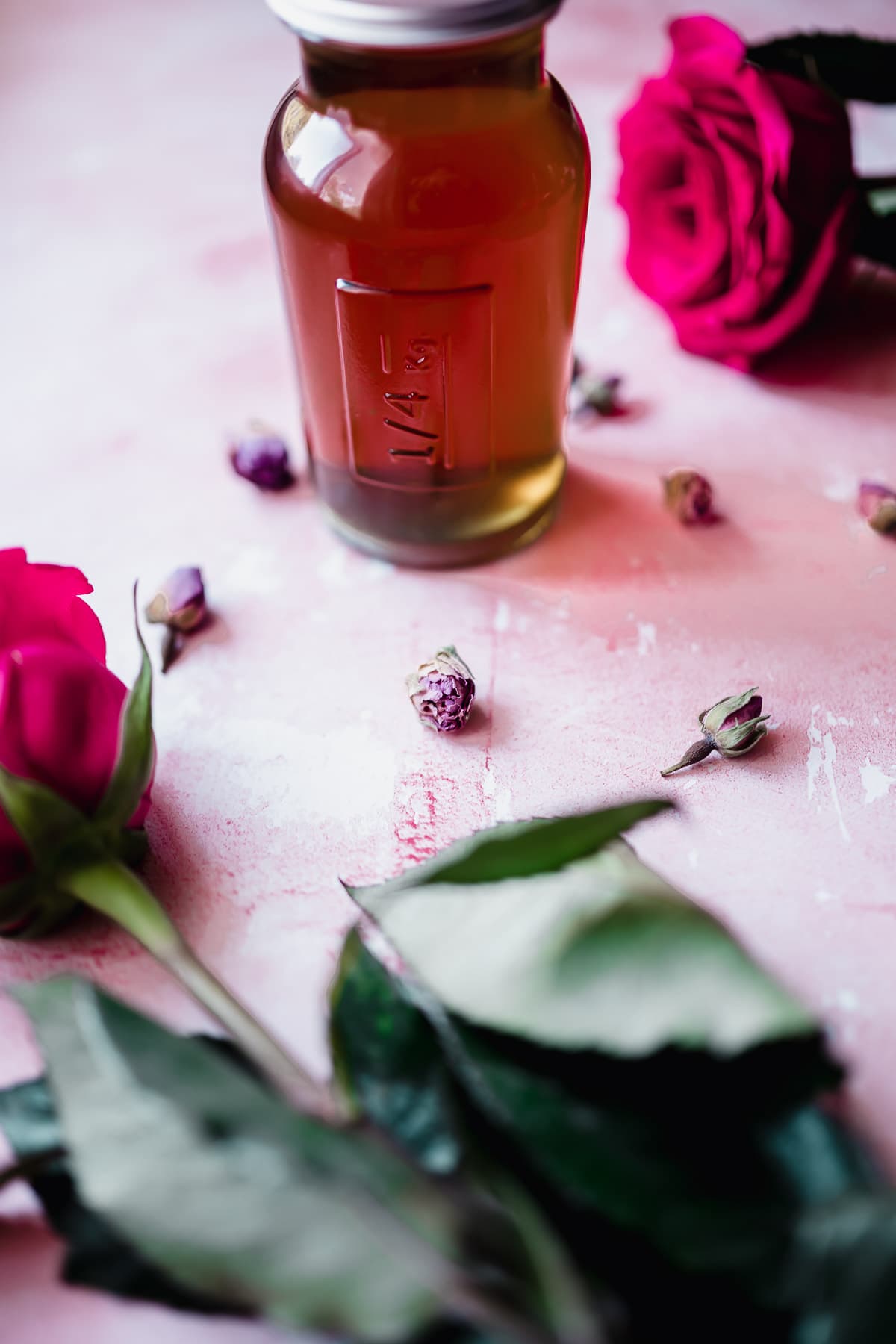
❓FAQ
Homemade rose water will last for up to a year when stored in a cool, dark place. If it starts to form crystals or the natural oils separate from the rose water, it’s time to toss it out.
Yes, rose petals and rosebuds can be used interchangeably, though the sepals (green part at base of petals) will offer a slightly different, but still delicious, flavor that is noticeable in culinary use. You’ll need twice as many rosebuds by volume than rose petals because rose buds are denser.
Yes, you can use either fresh or dried rose petals to make homemade rosewater.
Rosewater is great for all skin types, including sensitive and acne-prone skin. Rose water can also help to restore the pH balance of your skin after using harsh cleansers. It’s also a great way to cool down your skin in the summertime.
Yes, rosewater can be used as a facial toner. Simply dab some onto the skin using a cotton pad or apply with a fine mist spray bottle.
Rose petals are simply the rose flowers that have been removed from their stems.
🥀 Rose Water Infused Recipes
25 Delicious Edible Rose Recipes
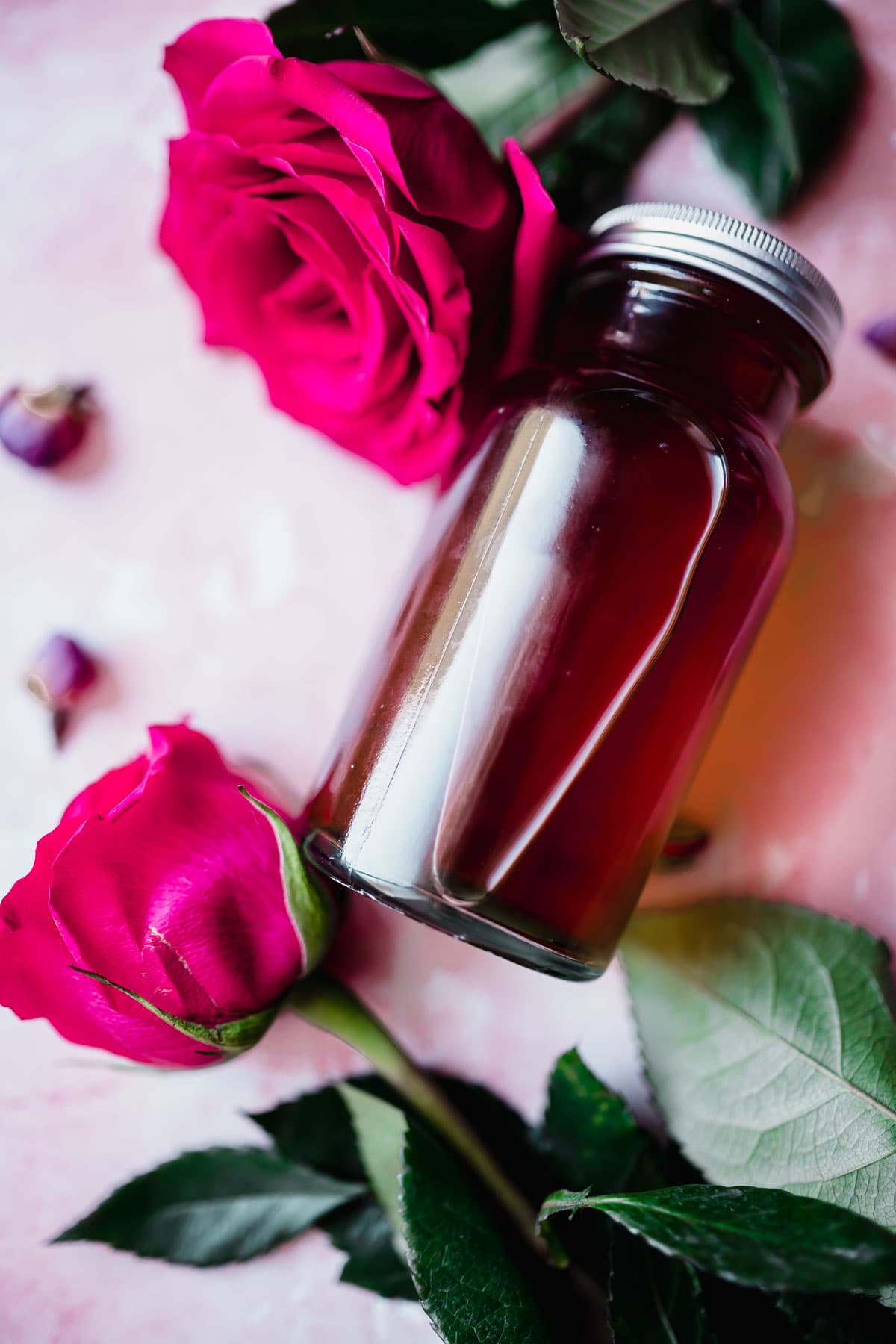
Give these two simple recipes a try and see which one works best for you!
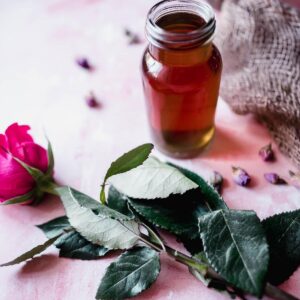
How to Make Rose Water at Home
Ingredients
- 1 cup dried rose petals or 2 cups fresh rose petals
- 5 cups distilled water
Instructions
Simmering Method
- Add the rose petals to a saucepan, then cover with the water.
- Turn the heat to high and bring to a boil.
- Once boiling, turn the heat to simmer and simmer for 20 minutes.
- Turn off the heat and let sit and steep for 1 hour.
- Strain, bottle and enjoy!
Distillation Method
- Place a heat-proof bowl in the center of a large pot.
- Add the rose petals and water to the pot around the bowl (make sure to not get anything inside of the bowl).
- Place the pot’s lid on upside down, then bring the water to a boil.
- Once boiling, reduce to a simmer, and add some ice to the top of the lid.
- As the ice melts, pour off the water and add more ice.
- Continue this process until the color from the petals fade and some clean and clear rose water has collected inside the bowl.
- Allow everything to cool before bottling and using. Enjoy!

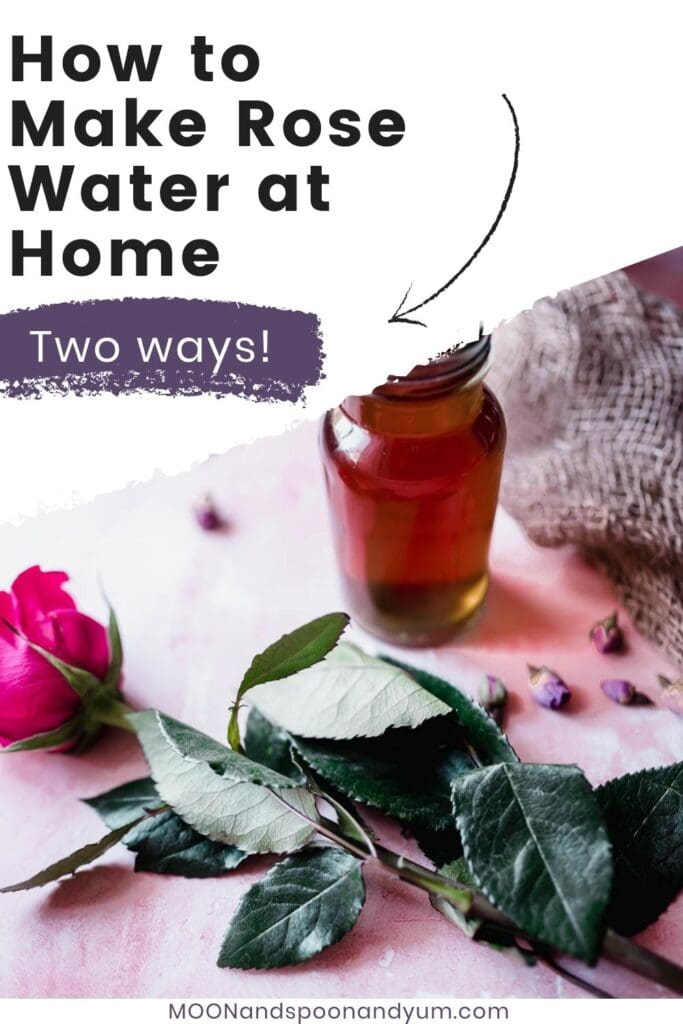

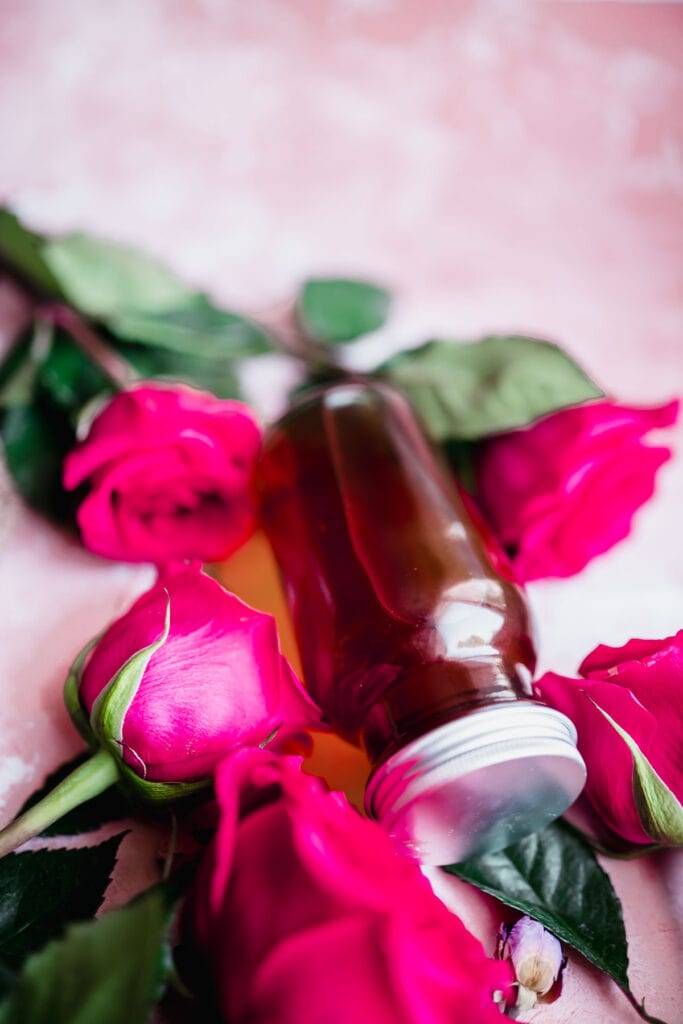
I have not tried this yet, but I assume it will be very helpful. I was wondering if there was any different to the rose water depending on what way you make it?
They are very similar, though I would say the distillation method is slightly more delicate and floral, whereas the simmering method is a bit more full-bodied. But I use both methods regularly and use them the same way. 🙂
can I use reverse osmosis water?
Yes, most certainly!
Love this! After I make the rose water, I want to use it as a mist for my face. It says to store it in a glass container. Can I put it in a plastic spray bottle up to a certain period of time? Thanks so much in advance! ~ Janis
Hi, Janis! That will work just fine. I’ve just found that if it’s kept in plastic for sustained periods of time, the nice rose smell doesn’t last as long and sometimes takes on a plastic smell. I hope this helps!
I can use purified water instead of distilled?
Yes, you can!
These ideas are great! I can’t wait to try them. Thanks for sharing.
I had no idea it was so easy to make. My house smells amazing.
I didn’t know rose water was so easy to make! I am using it to make Jewish desserts!
Brilliant I use rose water in my hair regime so I will definitely try my hand at making some.
Just made this rose water again, but this time using the distilling method! So fragrant! I think it worked even better than the simmering method 🙂
I love that rose water has anti-inflammatory properties. I can’t wait to make. I’m sure it smells amazing
I love that you are giving two ways of making the rose water. Always makes it easier!
This rose water recipe is fantastic! It’s so easy to make, and it has so many uses, I can’t recommend it enough!
I went foraging for rose recently, I am definitely going to make this next time.
I am so in love with rose water-flavoured desserts, that I had to start making my own rose water. I’ve followed our recipe to make a couple of batches, both times using the simmering method, and I am very pleased with the results! Really fragrant and so easy to make!
Wow, this was a great read to learn more about all the things you can do with rose water. And on top of all, so easy to make.
Ths is gorgeous in a gin and tonic and it’s good in ice cream too. So glad I can make this at home now.
I had no idea that rose water had so many benefits! Definitely a good recipe to know now that it is summertime and sunburn season.
Such a wonderful homemade recipe with so many uses! I love how you included two methods to prepare the rose water too.
I’ve always wanted to try rose water and it’s not sold near me. This is so good!
What a special recipe! My niece makes a cocktail with rose water, so I’ll definitely be gifting her some. I was pleasantly surprised that it lasts a year if stored properly. Thank you for another winning idea from Moon and Spoon and Yum.
I love rose water and had no idea it was so easy to make! Do you think it would be possible to make it into rose water syrup? I bet it would be incredible on pancakes!
Thanks for such a helpful guide! I added a touch of rose water to a gin fizz, and it gave the drink the perfect floral touch for summer.
I love using rosewater as a toner so I’m so glad I found this! Thank you!
I needed some rose water for a certain cocktail recipe and this was perfect! Love the light fragrance.
You describe everything so well. My roses are in bloom and I’m ready to give this a try. I was thinking of freezing some in ice cube trays to have it through the winter. That way I can pop a cube out and defrost as needed. Do you think that would work?
Thank you! I’m happy to hear that. I think that would work beautifully! 🙂
I had no idea that Rose water has anti-inflammatory and antiseptic properties, I can’t wait to make this and use it in skin care and baking.
I’ve been wanting to try rose water, so I used this recipe to make some and it turned out perfectly! Thank you!
This was so simple and came out great. I’ve been adding a splash to my bath at night. Love it!
This was amazing and such a treat! Thank you! Everyone in my family loved it.
The scent of roses are incredible when it comes to making your own. Its so easy to make and love how I can use it for multipurposes!
I never thought it was so easy to make rose water. I can`t thank you enough for this recipe!
I have always wanted to make my own face cream, so this would be perfect for it.
What a useful article! I find myself needing rose water for a recipe once in a while and can never get it in small quantities anywhere. Great to learn how to make rose water at home! Extremely helpful!
I love using rose water in recipes and for skincare but have always bought it from the store (and it can get pricey!) I can’t wait to try your homemade version – it looks so easy to make!
Ive tried the simmering method too. I love having rose water because it’s so natural. Im usually under the sun and it helps with my burnt skin!
I have super sensitive skin so use rose water for skin care. It can be really expensive and never thought about making it myself, until I found your recipe. So easy the follow, absolutely love making this at home, thank you for sharing!
I’ve been so intrigued to try rose water, and now I can’t wait to make my own! Thanks for sharing!
I didn’t think I could make this myself but with these directions I’m ready to give it a try.
I need to find organic roses to make this recipe. Such a nice idea!
I love how versatile this is and what you can use this for!
Thank you!